COMM 1040: Reflective Essay on Individual and Group Skills(Leadership)
VerifiedAdded on 2023/06/08
|6
|2214
|494
Essay
AI Summary
This essay provides a reflective analysis of the author's experiences with teamwork and leadership. The author reflects on a group project involving diverse team members, discussing challenges in communication and the application of Tuckman's stages of group development. The essay further delves into the author's understanding of leadership, particularly transformational leadership, and the complexities of implementing such techniques. The reflection includes insights on conflict management and the importance of interpersonal relationships in leadership. The author concludes by emphasizing the value of teamwork, leadership development, and the evolving nature of leadership in contemporary settings. Desklib provides students access to a wide range of solved assignments and past papers.
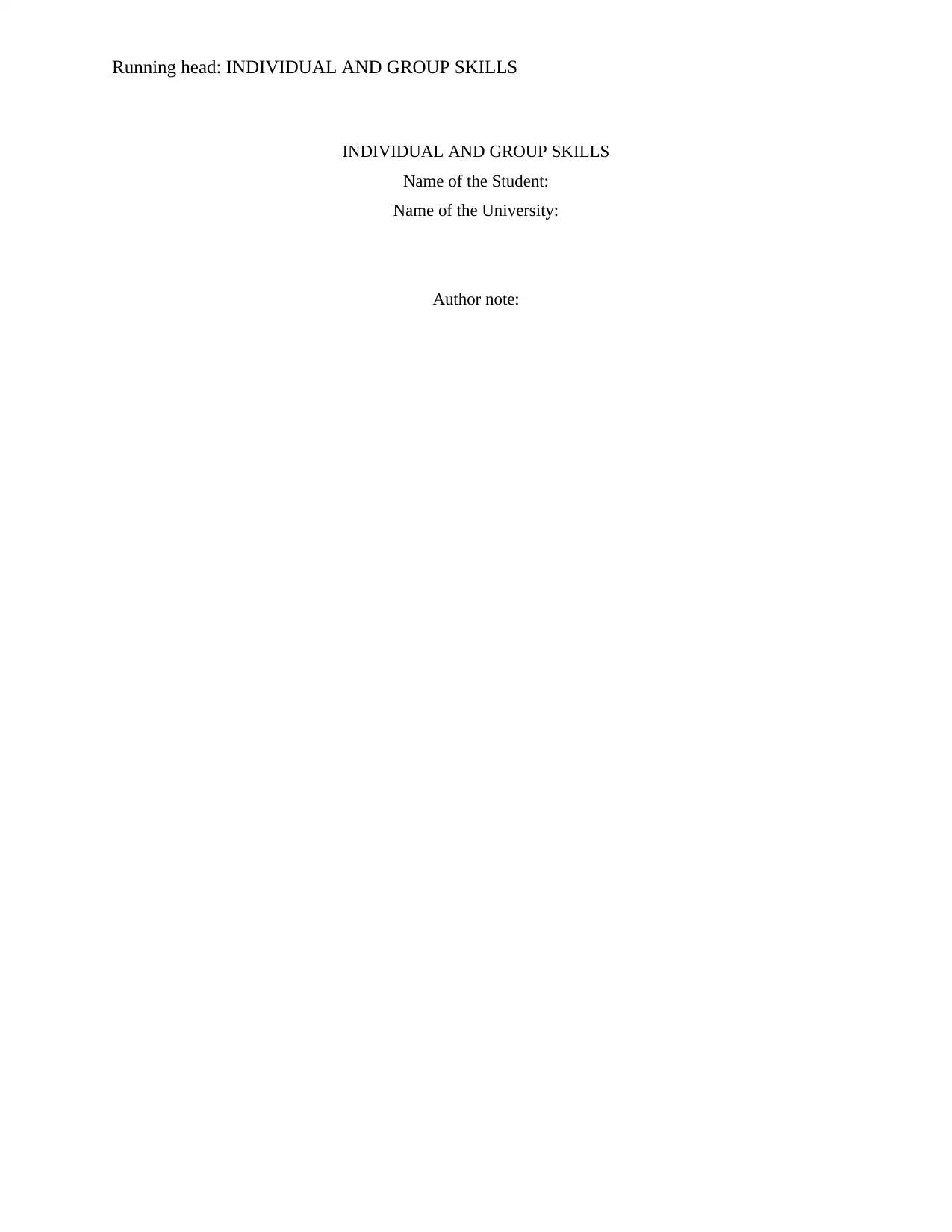
Running head: INDIVIDUAL AND GROUP SKILLS
INDIVIDUAL AND GROUP SKILLS
Name of the Student:
Name of the University:
Author note:
INDIVIDUAL AND GROUP SKILLS
Name of the Student:
Name of the University:
Author note:
Paraphrase This Document
Need a fresh take? Get an instant paraphrase of this document with our AI Paraphraser
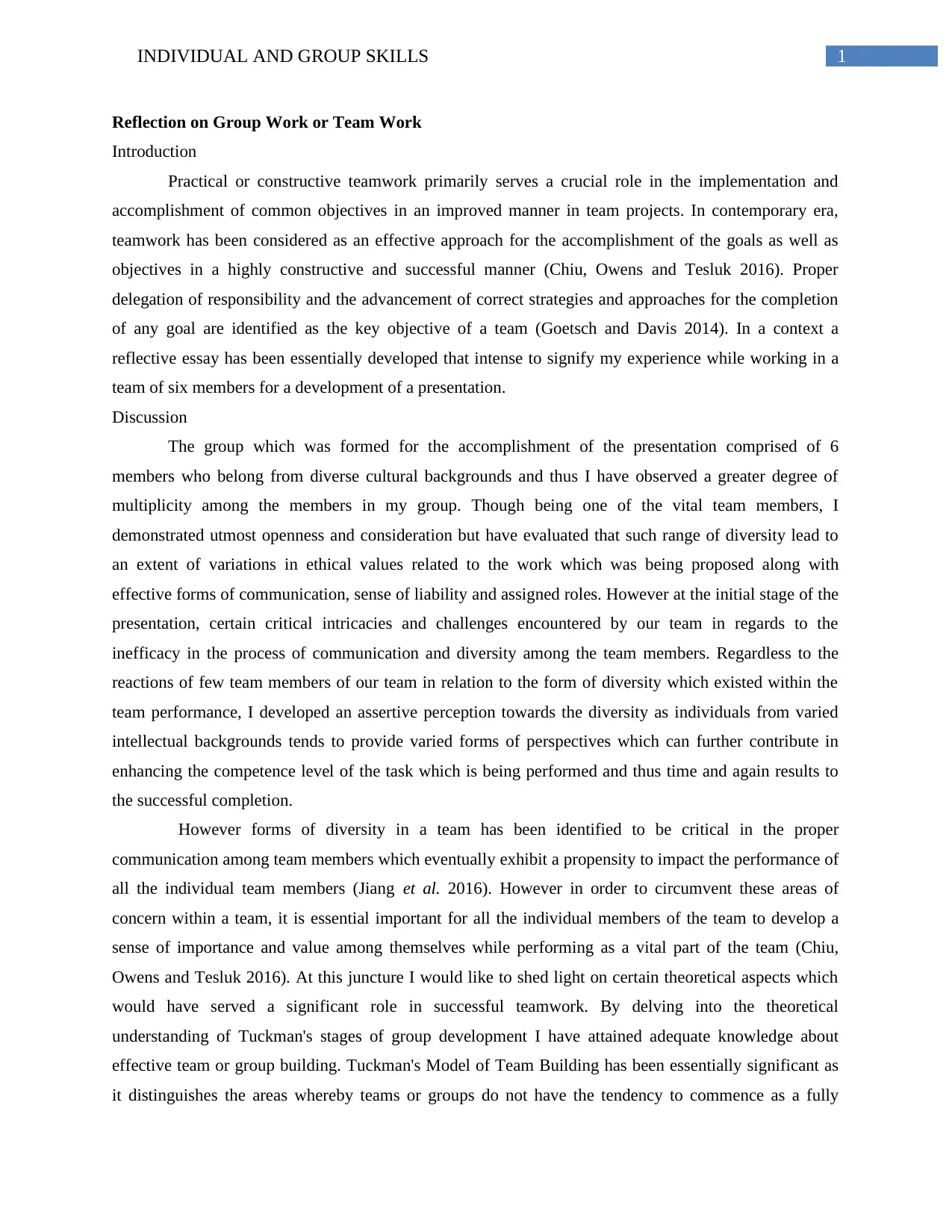
1INDIVIDUAL AND GROUP SKILLS
Reflection on Group Work or Team Work
Introduction
Practical or constructive teamwork primarily serves a crucial role in the implementation and
accomplishment of common objectives in an improved manner in team projects. In contemporary era,
teamwork has been considered as an effective approach for the accomplishment of the goals as well as
objectives in a highly constructive and successful manner (Chiu, Owens and Tesluk 2016). Proper
delegation of responsibility and the advancement of correct strategies and approaches for the completion
of any goal are identified as the key objective of a team (Goetsch and Davis 2014). In a context a
reflective essay has been essentially developed that intense to signify my experience while working in a
team of six members for a development of a presentation.
Discussion
The group which was formed for the accomplishment of the presentation comprised of 6
members who belong from diverse cultural backgrounds and thus I have observed a greater degree of
multiplicity among the members in my group. Though being one of the vital team members, I
demonstrated utmost openness and consideration but have evaluated that such range of diversity lead to
an extent of variations in ethical values related to the work which was being proposed along with
effective forms of communication, sense of liability and assigned roles. However at the initial stage of the
presentation, certain critical intricacies and challenges encountered by our team in regards to the
inefficacy in the process of communication and diversity among the team members. Regardless to the
reactions of few team members of our team in relation to the form of diversity which existed within the
team performance, I developed an assertive perception towards the diversity as individuals from varied
intellectual backgrounds tends to provide varied forms of perspectives which can further contribute in
enhancing the competence level of the task which is being performed and thus time and again results to
the successful completion.
However forms of diversity in a team has been identified to be critical in the proper
communication among team members which eventually exhibit a propensity to impact the performance of
all the individual team members (Jiang et al. 2016). However in order to circumvent these areas of
concern within a team, it is essential important for all the individual members of the team to develop a
sense of importance and value among themselves while performing as a vital part of the team (Chiu,
Owens and Tesluk 2016). At this juncture I would like to shed light on certain theoretical aspects which
would have served a significant role in successful teamwork. By delving into the theoretical
understanding of Tuckman's stages of group development I have attained adequate knowledge about
effective team or group building. Tuckman's Model of Team Building has been essentially significant as
it distinguishes the areas whereby teams or groups do not have the tendency to commence as a fully
Reflection on Group Work or Team Work
Introduction
Practical or constructive teamwork primarily serves a crucial role in the implementation and
accomplishment of common objectives in an improved manner in team projects. In contemporary era,
teamwork has been considered as an effective approach for the accomplishment of the goals as well as
objectives in a highly constructive and successful manner (Chiu, Owens and Tesluk 2016). Proper
delegation of responsibility and the advancement of correct strategies and approaches for the completion
of any goal are identified as the key objective of a team (Goetsch and Davis 2014). In a context a
reflective essay has been essentially developed that intense to signify my experience while working in a
team of six members for a development of a presentation.
Discussion
The group which was formed for the accomplishment of the presentation comprised of 6
members who belong from diverse cultural backgrounds and thus I have observed a greater degree of
multiplicity among the members in my group. Though being one of the vital team members, I
demonstrated utmost openness and consideration but have evaluated that such range of diversity lead to
an extent of variations in ethical values related to the work which was being proposed along with
effective forms of communication, sense of liability and assigned roles. However at the initial stage of the
presentation, certain critical intricacies and challenges encountered by our team in regards to the
inefficacy in the process of communication and diversity among the team members. Regardless to the
reactions of few team members of our team in relation to the form of diversity which existed within the
team performance, I developed an assertive perception towards the diversity as individuals from varied
intellectual backgrounds tends to provide varied forms of perspectives which can further contribute in
enhancing the competence level of the task which is being performed and thus time and again results to
the successful completion.
However forms of diversity in a team has been identified to be critical in the proper
communication among team members which eventually exhibit a propensity to impact the performance of
all the individual team members (Jiang et al. 2016). However in order to circumvent these areas of
concern within a team, it is essential important for all the individual members of the team to develop a
sense of importance and value among themselves while performing as a vital part of the team (Chiu,
Owens and Tesluk 2016). At this juncture I would like to shed light on certain theoretical aspects which
would have served a significant role in successful teamwork. By delving into the theoretical
understanding of Tuckman's stages of group development I have attained adequate knowledge about
effective team or group building. Tuckman's Model of Team Building has been essentially significant as
it distinguishes the areas whereby teams or groups do not have the tendency to commence as a fully
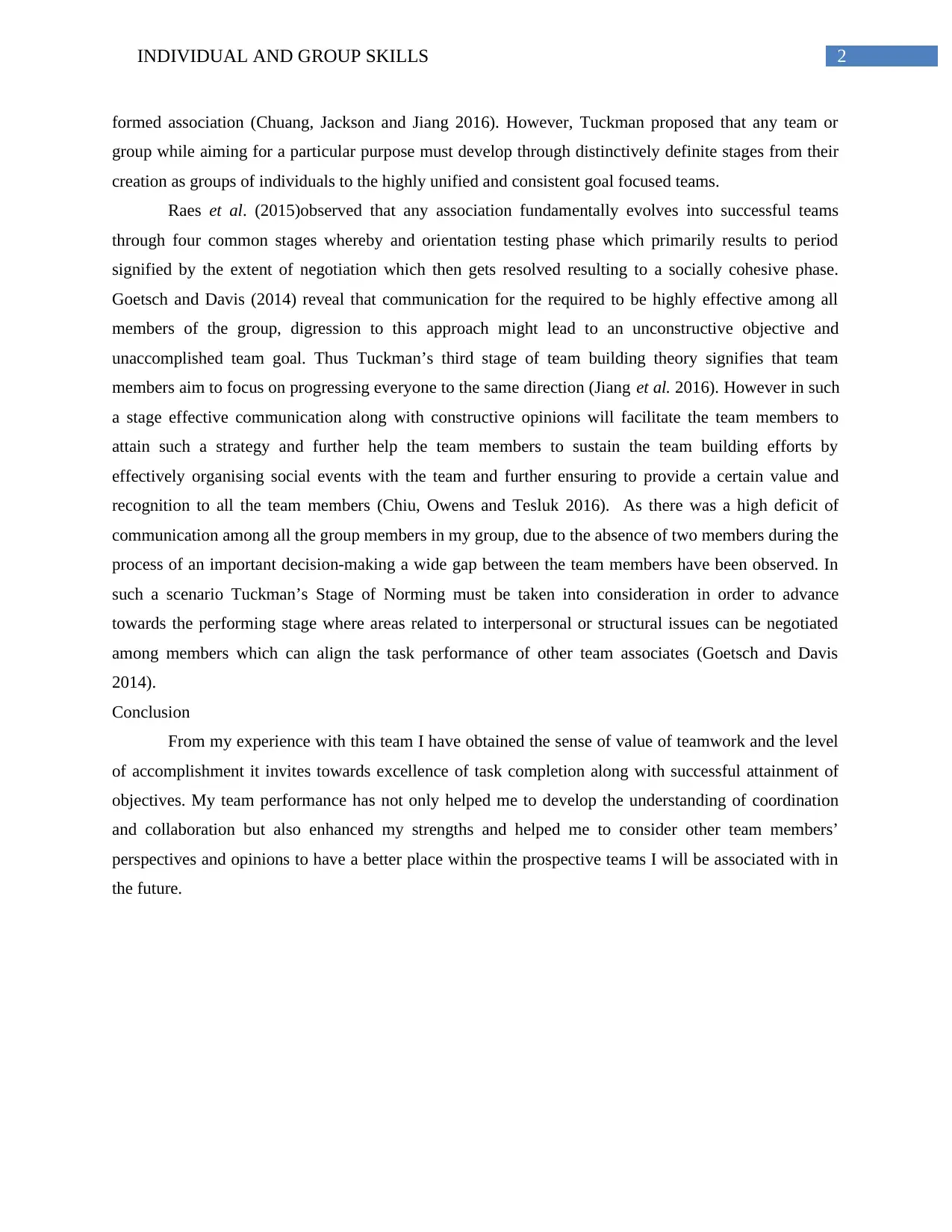
2INDIVIDUAL AND GROUP SKILLS
formed association (Chuang, Jackson and Jiang 2016). However, Tuckman proposed that any team or
group while aiming for a particular purpose must develop through distinctively definite stages from their
creation as groups of individuals to the highly unified and consistent goal focused teams.
Raes et al. (2015)observed that any association fundamentally evolves into successful teams
through four common stages whereby and orientation testing phase which primarily results to period
signified by the extent of negotiation which then gets resolved resulting to a socially cohesive phase.
Goetsch and Davis (2014) reveal that communication for the required to be highly effective among all
members of the group, digression to this approach might lead to an unconstructive objective and
unaccomplished team goal. Thus Tuckman’s third stage of team building theory signifies that team
members aim to focus on progressing everyone to the same direction (Jiang et al. 2016). However in such
a stage effective communication along with constructive opinions will facilitate the team members to
attain such a strategy and further help the team members to sustain the team building efforts by
effectively organising social events with the team and further ensuring to provide a certain value and
recognition to all the team members (Chiu, Owens and Tesluk 2016). As there was a high deficit of
communication among all the group members in my group, due to the absence of two members during the
process of an important decision-making a wide gap between the team members have been observed. In
such a scenario Tuckman’s Stage of Norming must be taken into consideration in order to advance
towards the performing stage where areas related to interpersonal or structural issues can be negotiated
among members which can align the task performance of other team associates (Goetsch and Davis
2014).
Conclusion
From my experience with this team I have obtained the sense of value of teamwork and the level
of accomplishment it invites towards excellence of task completion along with successful attainment of
objectives. My team performance has not only helped me to develop the understanding of coordination
and collaboration but also enhanced my strengths and helped me to consider other team members’
perspectives and opinions to have a better place within the prospective teams I will be associated with in
the future.
formed association (Chuang, Jackson and Jiang 2016). However, Tuckman proposed that any team or
group while aiming for a particular purpose must develop through distinctively definite stages from their
creation as groups of individuals to the highly unified and consistent goal focused teams.
Raes et al. (2015)observed that any association fundamentally evolves into successful teams
through four common stages whereby and orientation testing phase which primarily results to period
signified by the extent of negotiation which then gets resolved resulting to a socially cohesive phase.
Goetsch and Davis (2014) reveal that communication for the required to be highly effective among all
members of the group, digression to this approach might lead to an unconstructive objective and
unaccomplished team goal. Thus Tuckman’s third stage of team building theory signifies that team
members aim to focus on progressing everyone to the same direction (Jiang et al. 2016). However in such
a stage effective communication along with constructive opinions will facilitate the team members to
attain such a strategy and further help the team members to sustain the team building efforts by
effectively organising social events with the team and further ensuring to provide a certain value and
recognition to all the team members (Chiu, Owens and Tesluk 2016). As there was a high deficit of
communication among all the group members in my group, due to the absence of two members during the
process of an important decision-making a wide gap between the team members have been observed. In
such a scenario Tuckman’s Stage of Norming must be taken into consideration in order to advance
towards the performing stage where areas related to interpersonal or structural issues can be negotiated
among members which can align the task performance of other team associates (Goetsch and Davis
2014).
Conclusion
From my experience with this team I have obtained the sense of value of teamwork and the level
of accomplishment it invites towards excellence of task completion along with successful attainment of
objectives. My team performance has not only helped me to develop the understanding of coordination
and collaboration but also enhanced my strengths and helped me to consider other team members’
perspectives and opinions to have a better place within the prospective teams I will be associated with in
the future.
⊘ This is a preview!⊘
Do you want full access?
Subscribe today to unlock all pages.

Trusted by 1+ million students worldwide
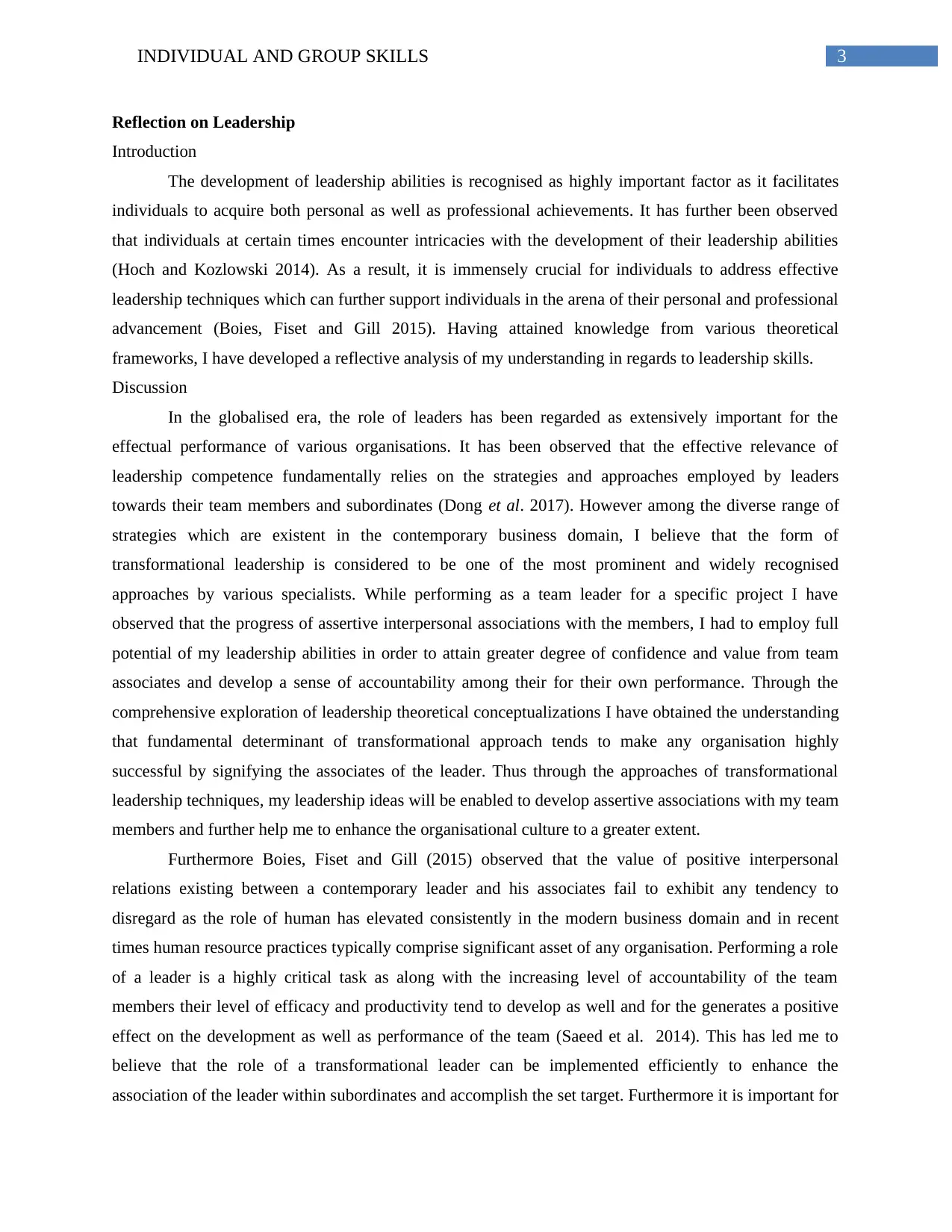
3INDIVIDUAL AND GROUP SKILLS
Reflection on Leadership
Introduction
The development of leadership abilities is recognised as highly important factor as it facilitates
individuals to acquire both personal as well as professional achievements. It has further been observed
that individuals at certain times encounter intricacies with the development of their leadership abilities
(Hoch and Kozlowski 2014). As a result, it is immensely crucial for individuals to address effective
leadership techniques which can further support individuals in the arena of their personal and professional
advancement (Boies, Fiset and Gill 2015). Having attained knowledge from various theoretical
frameworks, I have developed a reflective analysis of my understanding in regards to leadership skills.
Discussion
In the globalised era, the role of leaders has been regarded as extensively important for the
effectual performance of various organisations. It has been observed that the effective relevance of
leadership competence fundamentally relies on the strategies and approaches employed by leaders
towards their team members and subordinates (Dong et al. 2017). However among the diverse range of
strategies which are existent in the contemporary business domain, I believe that the form of
transformational leadership is considered to be one of the most prominent and widely recognised
approaches by various specialists. While performing as a team leader for a specific project I have
observed that the progress of assertive interpersonal associations with the members, I had to employ full
potential of my leadership abilities in order to attain greater degree of confidence and value from team
associates and develop a sense of accountability among their for their own performance. Through the
comprehensive exploration of leadership theoretical conceptualizations I have obtained the understanding
that fundamental determinant of transformational approach tends to make any organisation highly
successful by signifying the associates of the leader. Thus through the approaches of transformational
leadership techniques, my leadership ideas will be enabled to develop assertive associations with my team
members and further help me to enhance the organisational culture to a greater extent.
Furthermore Boies, Fiset and Gill (2015) observed that the value of positive interpersonal
relations existing between a contemporary leader and his associates fail to exhibit any tendency to
disregard as the role of human has elevated consistently in the modern business domain and in recent
times human resource practices typically comprise significant asset of any organisation. Performing a role
of a leader is a highly critical task as along with the increasing level of accountability of the team
members their level of efficacy and productivity tend to develop as well and for the generates a positive
effect on the development as well as performance of the team (Saeed et al. 2014). This has led me to
believe that the role of a transformational leader can be implemented efficiently to enhance the
association of the leader within subordinates and accomplish the set target. Furthermore it is important for
Reflection on Leadership
Introduction
The development of leadership abilities is recognised as highly important factor as it facilitates
individuals to acquire both personal as well as professional achievements. It has further been observed
that individuals at certain times encounter intricacies with the development of their leadership abilities
(Hoch and Kozlowski 2014). As a result, it is immensely crucial for individuals to address effective
leadership techniques which can further support individuals in the arena of their personal and professional
advancement (Boies, Fiset and Gill 2015). Having attained knowledge from various theoretical
frameworks, I have developed a reflective analysis of my understanding in regards to leadership skills.
Discussion
In the globalised era, the role of leaders has been regarded as extensively important for the
effectual performance of various organisations. It has been observed that the effective relevance of
leadership competence fundamentally relies on the strategies and approaches employed by leaders
towards their team members and subordinates (Dong et al. 2017). However among the diverse range of
strategies which are existent in the contemporary business domain, I believe that the form of
transformational leadership is considered to be one of the most prominent and widely recognised
approaches by various specialists. While performing as a team leader for a specific project I have
observed that the progress of assertive interpersonal associations with the members, I had to employ full
potential of my leadership abilities in order to attain greater degree of confidence and value from team
associates and develop a sense of accountability among their for their own performance. Through the
comprehensive exploration of leadership theoretical conceptualizations I have obtained the understanding
that fundamental determinant of transformational approach tends to make any organisation highly
successful by signifying the associates of the leader. Thus through the approaches of transformational
leadership techniques, my leadership ideas will be enabled to develop assertive associations with my team
members and further help me to enhance the organisational culture to a greater extent.
Furthermore Boies, Fiset and Gill (2015) observed that the value of positive interpersonal
relations existing between a contemporary leader and his associates fail to exhibit any tendency to
disregard as the role of human has elevated consistently in the modern business domain and in recent
times human resource practices typically comprise significant asset of any organisation. Performing a role
of a leader is a highly critical task as along with the increasing level of accountability of the team
members their level of efficacy and productivity tend to develop as well and for the generates a positive
effect on the development as well as performance of the team (Saeed et al. 2014). This has led me to
believe that the role of a transformational leader can be implemented efficiently to enhance the
association of the leader within subordinates and accomplish the set target. Furthermore it is important for
Paraphrase This Document
Need a fresh take? Get an instant paraphrase of this document with our AI Paraphraser
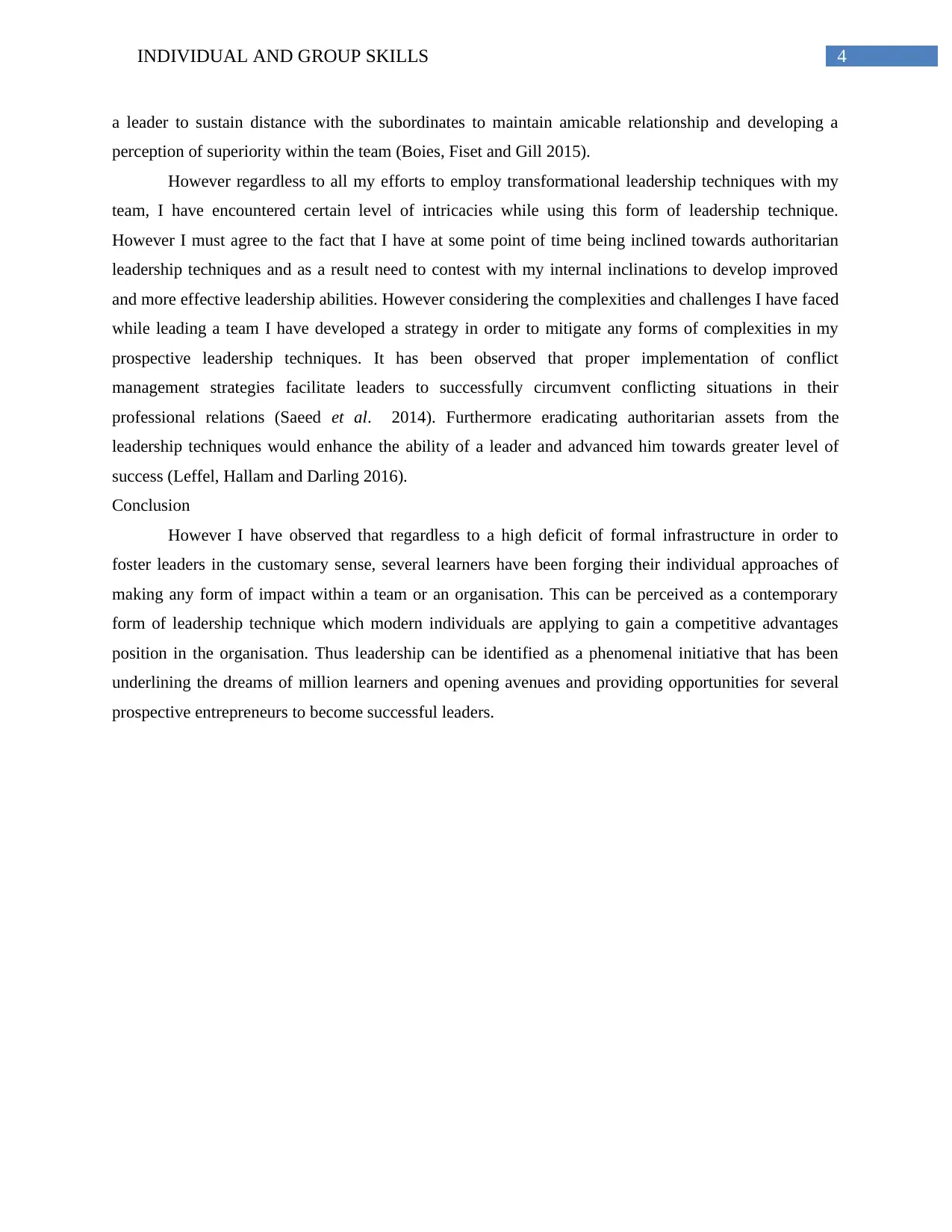
4INDIVIDUAL AND GROUP SKILLS
a leader to sustain distance with the subordinates to maintain amicable relationship and developing a
perception of superiority within the team (Boies, Fiset and Gill 2015).
However regardless to all my efforts to employ transformational leadership techniques with my
team, I have encountered certain level of intricacies while using this form of leadership technique.
However I must agree to the fact that I have at some point of time being inclined towards authoritarian
leadership techniques and as a result need to contest with my internal inclinations to develop improved
and more effective leadership abilities. However considering the complexities and challenges I have faced
while leading a team I have developed a strategy in order to mitigate any forms of complexities in my
prospective leadership techniques. It has been observed that proper implementation of conflict
management strategies facilitate leaders to successfully circumvent conflicting situations in their
professional relations (Saeed et al. 2014). Furthermore eradicating authoritarian assets from the
leadership techniques would enhance the ability of a leader and advanced him towards greater level of
success (Leffel, Hallam and Darling 2016).
Conclusion
However I have observed that regardless to a high deficit of formal infrastructure in order to
foster leaders in the customary sense, several learners have been forging their individual approaches of
making any form of impact within a team or an organisation. This can be perceived as a contemporary
form of leadership technique which modern individuals are applying to gain a competitive advantages
position in the organisation. Thus leadership can be identified as a phenomenal initiative that has been
underlining the dreams of million learners and opening avenues and providing opportunities for several
prospective entrepreneurs to become successful leaders.
a leader to sustain distance with the subordinates to maintain amicable relationship and developing a
perception of superiority within the team (Boies, Fiset and Gill 2015).
However regardless to all my efforts to employ transformational leadership techniques with my
team, I have encountered certain level of intricacies while using this form of leadership technique.
However I must agree to the fact that I have at some point of time being inclined towards authoritarian
leadership techniques and as a result need to contest with my internal inclinations to develop improved
and more effective leadership abilities. However considering the complexities and challenges I have faced
while leading a team I have developed a strategy in order to mitigate any forms of complexities in my
prospective leadership techniques. It has been observed that proper implementation of conflict
management strategies facilitate leaders to successfully circumvent conflicting situations in their
professional relations (Saeed et al. 2014). Furthermore eradicating authoritarian assets from the
leadership techniques would enhance the ability of a leader and advanced him towards greater level of
success (Leffel, Hallam and Darling 2016).
Conclusion
However I have observed that regardless to a high deficit of formal infrastructure in order to
foster leaders in the customary sense, several learners have been forging their individual approaches of
making any form of impact within a team or an organisation. This can be perceived as a contemporary
form of leadership technique which modern individuals are applying to gain a competitive advantages
position in the organisation. Thus leadership can be identified as a phenomenal initiative that has been
underlining the dreams of million learners and opening avenues and providing opportunities for several
prospective entrepreneurs to become successful leaders.
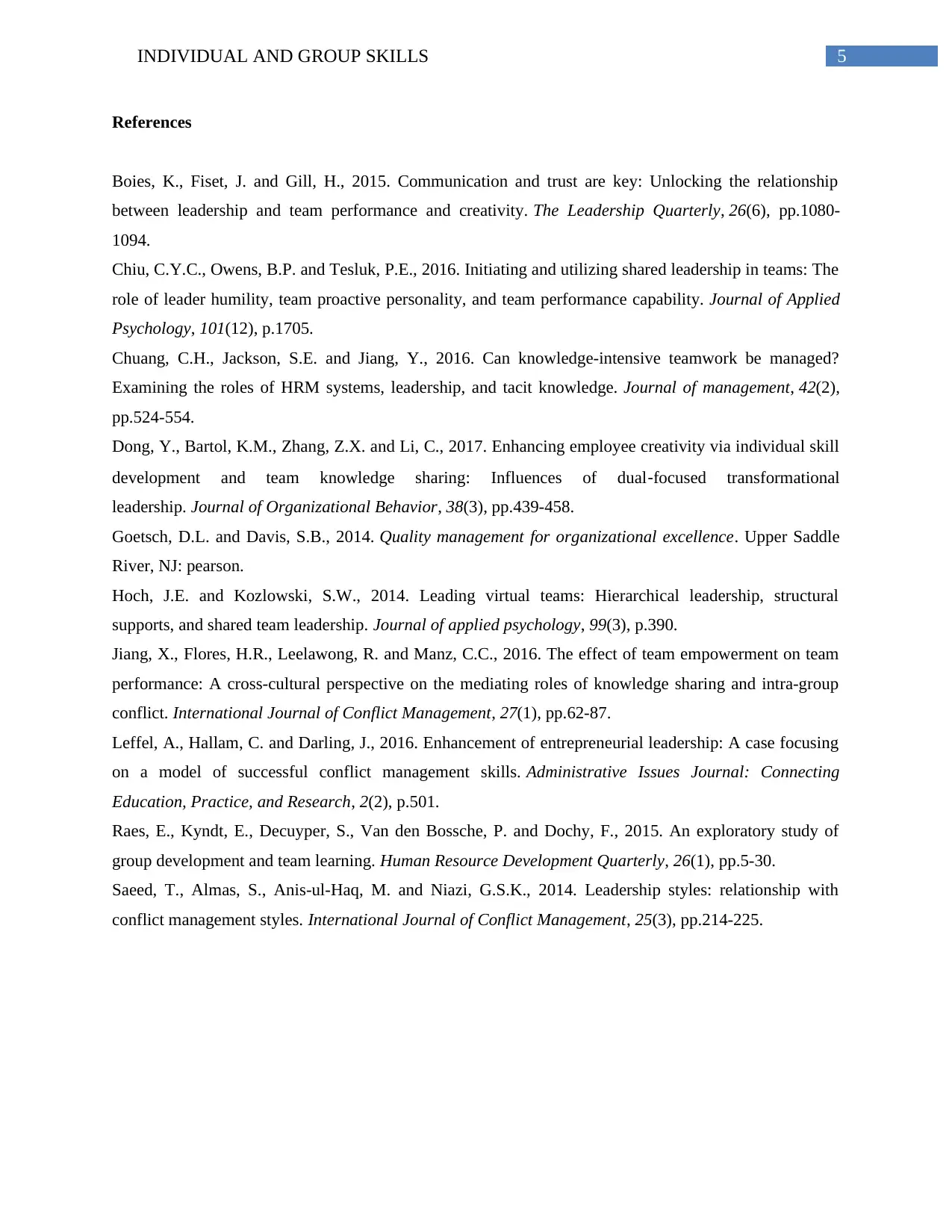
5INDIVIDUAL AND GROUP SKILLS
References
Boies, K., Fiset, J. and Gill, H., 2015. Communication and trust are key: Unlocking the relationship
between leadership and team performance and creativity. The Leadership Quarterly, 26(6), pp.1080-
1094.
Chiu, C.Y.C., Owens, B.P. and Tesluk, P.E., 2016. Initiating and utilizing shared leadership in teams: The
role of leader humility, team proactive personality, and team performance capability. Journal of Applied
Psychology, 101(12), p.1705.
Chuang, C.H., Jackson, S.E. and Jiang, Y., 2016. Can knowledge-intensive teamwork be managed?
Examining the roles of HRM systems, leadership, and tacit knowledge. Journal of management, 42(2),
pp.524-554.
Dong, Y., Bartol, K.M., Zhang, Z.X. and Li, C., 2017. Enhancing employee creativity via individual skill
development and team knowledge sharing: Influences of dual‐focused transformational
leadership. Journal of Organizational Behavior, 38(3), pp.439-458.
Goetsch, D.L. and Davis, S.B., 2014. Quality management for organizational excellence. Upper Saddle
River, NJ: pearson.
Hoch, J.E. and Kozlowski, S.W., 2014. Leading virtual teams: Hierarchical leadership, structural
supports, and shared team leadership. Journal of applied psychology, 99(3), p.390.
Jiang, X., Flores, H.R., Leelawong, R. and Manz, C.C., 2016. The effect of team empowerment on team
performance: A cross-cultural perspective on the mediating roles of knowledge sharing and intra-group
conflict. International Journal of Conflict Management, 27(1), pp.62-87.
Leffel, A., Hallam, C. and Darling, J., 2016. Enhancement of entrepreneurial leadership: A case focusing
on a model of successful conflict management skills. Administrative Issues Journal: Connecting
Education, Practice, and Research, 2(2), p.501.
Raes, E., Kyndt, E., Decuyper, S., Van den Bossche, P. and Dochy, F., 2015. An exploratory study of
group development and team learning. Human Resource Development Quarterly, 26(1), pp.5-30.
Saeed, T., Almas, S., Anis-ul-Haq, M. and Niazi, G.S.K., 2014. Leadership styles: relationship with
conflict management styles. International Journal of Conflict Management, 25(3), pp.214-225.
References
Boies, K., Fiset, J. and Gill, H., 2015. Communication and trust are key: Unlocking the relationship
between leadership and team performance and creativity. The Leadership Quarterly, 26(6), pp.1080-
1094.
Chiu, C.Y.C., Owens, B.P. and Tesluk, P.E., 2016. Initiating and utilizing shared leadership in teams: The
role of leader humility, team proactive personality, and team performance capability. Journal of Applied
Psychology, 101(12), p.1705.
Chuang, C.H., Jackson, S.E. and Jiang, Y., 2016. Can knowledge-intensive teamwork be managed?
Examining the roles of HRM systems, leadership, and tacit knowledge. Journal of management, 42(2),
pp.524-554.
Dong, Y., Bartol, K.M., Zhang, Z.X. and Li, C., 2017. Enhancing employee creativity via individual skill
development and team knowledge sharing: Influences of dual‐focused transformational
leadership. Journal of Organizational Behavior, 38(3), pp.439-458.
Goetsch, D.L. and Davis, S.B., 2014. Quality management for organizational excellence. Upper Saddle
River, NJ: pearson.
Hoch, J.E. and Kozlowski, S.W., 2014. Leading virtual teams: Hierarchical leadership, structural
supports, and shared team leadership. Journal of applied psychology, 99(3), p.390.
Jiang, X., Flores, H.R., Leelawong, R. and Manz, C.C., 2016. The effect of team empowerment on team
performance: A cross-cultural perspective on the mediating roles of knowledge sharing and intra-group
conflict. International Journal of Conflict Management, 27(1), pp.62-87.
Leffel, A., Hallam, C. and Darling, J., 2016. Enhancement of entrepreneurial leadership: A case focusing
on a model of successful conflict management skills. Administrative Issues Journal: Connecting
Education, Practice, and Research, 2(2), p.501.
Raes, E., Kyndt, E., Decuyper, S., Van den Bossche, P. and Dochy, F., 2015. An exploratory study of
group development and team learning. Human Resource Development Quarterly, 26(1), pp.5-30.
Saeed, T., Almas, S., Anis-ul-Haq, M. and Niazi, G.S.K., 2014. Leadership styles: relationship with
conflict management styles. International Journal of Conflict Management, 25(3), pp.214-225.
⊘ This is a preview!⊘
Do you want full access?
Subscribe today to unlock all pages.

Trusted by 1+ million students worldwide
1 out of 6
Related Documents
Your All-in-One AI-Powered Toolkit for Academic Success.
+13062052269
info@desklib.com
Available 24*7 on WhatsApp / Email
![[object Object]](/_next/static/media/star-bottom.7253800d.svg)
Unlock your academic potential
Copyright © 2020–2025 A2Z Services. All Rights Reserved. Developed and managed by ZUCOL.




